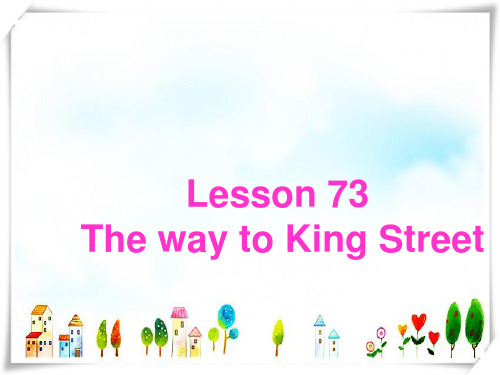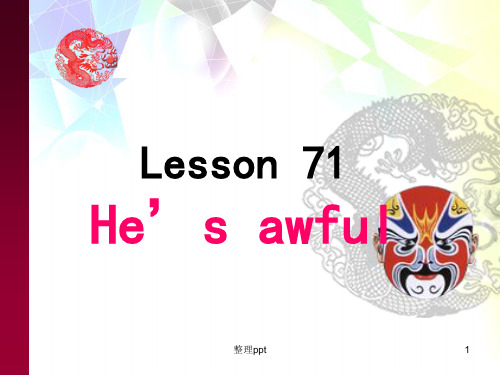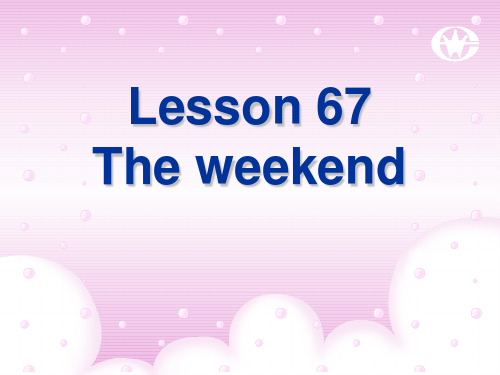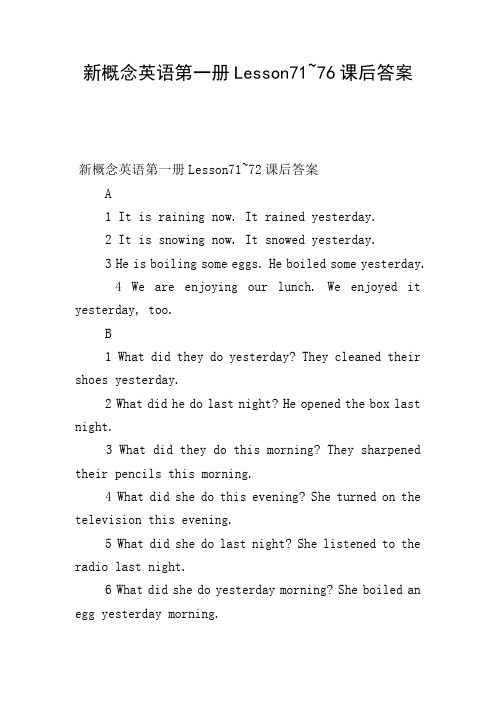新概念英语第一册lesson 71课件
新概念英语NCE1_lesson73-74课件

8. Excuse me. 打扰一下,请问…(事前) I’m sorry. 对不起,很抱歉(事后)
9.tell sb. the way to, 告诉某人去……的路。
问路: How can I get to...? Where is ...?
The man smiled pleasantly.
He did not understand English!
时态 一般现 在时
一般过 去时
用法 动词 肯定句 否定句 形式
一般、 原形/ I do… I don’t
经常、 三单 He
do…
习惯、 do/do does… He
真理 es
doesn
’t
do …
过去 某一 时
间做 了某 事
过去 式
did
I did…
HeHe didn’t do…
注:直接引用说话者的话叫做直接引语
5. see:看见,强调结果,see sth. look:看,强调动作,look at sth. hear-listen find-look for
6. ask sb. sth. 问某人某事。 eg:He asked the teacher a question.
do
He spoke German. He was a tourist.
speak
is
Then he put his hand into pocket, put
and took out a phrasebook. take
put… into… 把…放进…中 take…out of… 把…从…中取出
一般疑问 句及其回 答
特殊疑问 句及其回 答
Do you What do like milk? you like?
新概念英语71课单词

新概念英语71课单词新概念英语第71课的单词包括:
1. Prosperous.
2. Unemployment.
3. Inflation.
4. Deflation.
5. Recession.
6. Recovery.
7. Economic.
8. Downturn.
9. Boom.
10. Slump.
"Prosperous" 意为“繁荣的”,"Unemployment" 意为“失业”,"Inflation" 意为“通货膨胀”,"Deflation" 意为“通货紧缩”,"Recession" 意为“经济衰退”,"Recovery" 意为“复苏”,"Economic" 意为“经济的”,"Downturn" 意为“衰退”,"Boom" 意为“繁荣”,"Slump" 意为“暴跌”。
这些单词是与经济和金融相关的,掌握它们可以帮助我们更好地理解和讨论与经济相关的话题。
在学习这些单词时,可以结合实际情境进行练习,例如阅读相关的经济新闻或文章,以加深对这些单词的理解和记忆。
同时,也可以通过与他人讨论经济话题的方式来运用这些单词,从而加深记忆。
希望这些单词对你的学习有所帮助。
新概念英语第一册第71课一般过去时

• 3. 以“辅音字母+y”结尾,变y为i加ed
• stop plan
• 4. 以“辅音+元音+辅音”辅元辅结尾,双写最后
的辅音加ed
整理ppt
25
一般过去时的标志性时间状语
yesterday短语, yesterday morning/afternoon/evening
last短语 last night/Monday/week/month/year,
★awful awfully
•
adj. 让人讨厌的,坏的 adv. 非常(在表示负面的情景中,可用
awfully代替very)
I am awfully(very) sorry.
整理ppt
3
• time n.
• ①次(数)C
• once
• twice
• 3 times ≥3 数词+times
• ② 时间 U
What did you sing together yesterday?
整理ppt
7
他们昨天晚上给我打电话了。
They telephoned me last night. They didn't telephone me last night. Did they telephone you last night? Yes,they did. No, they didn't. What did they do last night?
speak with sb (spoke) Can I speak with you for a minute?
整理ppt
16
整理ppt
17
整理ppt
18
新概念英语第一册71-72

练习一:
1. can he ____a story in English? A. tell B. speak C. say D. talk 2. The teacher _____ us to finish the homework in time. A. tells B. speaks C. says D. talks 3.What would you like to ______ us about you hometown. A. speak B. talk C. say D. tell
二、 用所给词的适当形式填空。
came 1. Tom and Mary ___________ (come) to China last month. 2. Mike _________________(not go) to bed until 12 o'clock didn't go last night. So he ______ got (get) up late. read 3. Mary __________ (read) English yesterday morning. began 4. Tom ___________ (begin) to learn Chinese last year. 5. My mother ________________ (not do) housework didn't do yesterday. was 6. There ____________ a telephone call for you just now. (be) 7. -When did _______ you _________ (come) to china? come Last year. Was 8. _________ (be) it cold in your city yesterday? were 9. How many people ________ (be) there in your class last term? 10. There ________ (be) a football match on TV yesterday was evening, but I _________ (have) no time to watch it. had
新概念英语第一册课件LessonPPT完整版

新概念英语第一册课件Lesson121-122 (共45张PPT)
新概念英语第一册课件Lesson121-122 (共45张PPT)
serve v. 照应,服务,接待
❖ custom 风俗 ❖ customs 海关 ❖ 有顾客customer的地方,肯定就有 shop
assistant /waiter/waitress ❖ guest 旅馆的旅客 ❖ passenger 乘客
新概念英语第一册课件Lesson121-122 (共45张PPT)
Hale Waihona Puke 新概念英语第一册课件Lesson121-122 (共45张PPT)
三、课文经典句回放。 1. 他们进到屋里后,走进了饭厅。 After they had __e_n_t_e_re_d___ the ___h_o_u_s_e___, they went ___i_n_t_o____ the ___d_i_n_n_in_g__ ____r_o_o_m___. 2. 小偷扔下了手电筒,飞快地逃走了。 The __t_h_i_e_v_es___ dropped the ___t_o_r_c_h___ and ran away as ___q_u_ic_k_l_y__ as they could. 3. 是一年前发生在我的一个朋友身上的故事。 It _h_a_p_p_e_n_e_d__ to a ___fr_i_e_n_d___ of mine a ___y_e_a_r__ ago.
n. 顾客 v. 忘记 n. 经理 v. 照应,服务,
接待 n. 柜台 v. 认出
新概念英语第一册第67-68课课件(共41张PPT)

Aren't you lucky! ✲ 这句话是否定疑问句形式的感叹句,为的是加强语气。 尽管形式上是否定的,但却表示强有力的肯定。
Grammar
语法
一般过去时(simple past tense) :
过去发生的而现在已经结束的动作要用一般过去时。
基本用法:
1、常用来表示过去某一时间所发生的非持续性动作;
Lesson 67 The weekend
Discussion
What did you do on weekend ?
New Words
greengrocer 蔬菜水果零售商
absent
缺席的
keep
处于、保持
spend
度过
weekend 周末
country
乡村、国家
lucky
幸运的
New Words
5、We played(play的过去式) computer games together. 我们在一起玩了电脑游戏。
6、It ran(run的过去式) after a cat yesterday. 它昨天跑着追赶一只猫。
7、They made(make的过去式) a bookcase for Jim. 他们为Jim做了一个书架。
⑥Miss Zhang was ill 2 days ago. 张小姐前两天病了。
Miss Zhang wasn’t ill 2 days ago. 张小姐前两天没有生病。
一般过去时的句型构成形式:
一、含有系动词(be动词——am/is/are)的一般过去时形式:
✿疑问句: Was /Were + 主语 + …?
新概念英语第一册Lesson71~76课后答案

新概念英语第一册Lesson71~76课后答案新概念英语第一册Lesson71~72课后答案A1 It is raining now. It rained yesterday.2 It is snowing now. It snowed yesterday.3 He is boiling some eggs. He boiled some yesterday.4 We are enjoying our lunch. We enjoyed it yesterday, too.B1 What did they do yesterday? They cleaned their shoes yesterday.2 What did he do last night? He opened the box last night.3 What did they do this morning? They sharpened their pencils this morning.4 What did she do this evening? She turned on the television this evening.5 What did she do last night? She listened to the radio last night.6 What did she do yesterday morning? She boiled an egg yesterday morning.7 What did they do yesterday afternoon? They playeda game yesterday afternoon.8 What did he do in the morning the day before yesterday? He stayed in bed in the morning the day before yesterday.9 What did she do yesterday evening? She telephoned her husband yesterday evening.10 What did she do the night before last? She called the doctor the night before last.新概念英语第一册Lesson73~74课后答案A1 He read the phrase slowly.2 He worked lazily.3 He cut himself badly.4 He worked carefully.5 The door opened suddenly.B1 He does not know me very well.2 She worked very hard.3 She smiled pleasantly.4 The bus went hurriedly.5 He shaved slowly.6 She drank a glass of water thirstily.7 He greeted me warmly.8 We enjoyed ourselves very much.新概念英语第一册Lesson75~76课后答案A1 She met her friends yesterday.2 They drank some milk yesterday.3 He swam in the river yesterday.4 She took him to school yesterday.5 He cut himself yesterday.B1 When did you walk across the park? I walked across the park last week.2 When did you wash your hands? I washed my handsa minute ago.3 When did you work in an office? I worked in an office the year before last.4 When did you ask a question? I asked a question five minutes ago.5 When did you type those letters? I typed those letters a month ago.6 When did you watch television? I watched television every day this week.7 When did you talk to the shop assistant? I talked to the shop assistant last month.8 When did you thank your father? I thanked myfather an hour ago.9 When did you dust the cupboard? I dusted the cupboard three days ago.10 When did you paint that bookcase? I painted that bookcase the year before last.11 When did you want a car like that one? I wanteda car like that one a year ago.12 When did you greet her? I greeted her a minute ago.。
NCE1_Lesson107-108(共45页)新概念英语第1册课件

Key words and expressions
•
★madam(对妇女的尊称名词)夫人,女士 服务行业的人员常用此称呼;同时,对于不 知姓名的女士也可以用此来表示尊重。这个 单词也可拼作ma'am [mæm]. Do you like this dress,madam? What can I do for you,madam?
Let’s review—A card from Jimmy
• • • • • • • • • --Read Jimmy's card to me please, Penny. --I have just arrived in Scotland and I'm staying at a Youth Hostel.’ --Eh? --He says he's just arrived in Scotland. He says he's staying at a Youth Hostel. You know he's a member of the Y.H.A. --The what? --The Y.H.A., Mum. The Youth Hostels Association.
• --What's it?
• --It's a dictionary. I hope it'll help you.
Key words and expressions
• • • • • madam n. 夫人,女士 smart adj. 漂亮的 as well 同样 suit v. 适于 pretty adj. 漂亮的
Key words and expressions
★pretty (形容词)漂亮的
- 1、下载文档前请自行甄别文档内容的完整性,平台不提供额外的编辑、内容补充、找答案等附加服务。
- 2、"仅部分预览"的文档,不可在线预览部分如存在完整性等问题,可反馈申请退款(可完整预览的文档不适用该条件!)。
- 3、如文档侵犯您的权益,请联系客服反馈,我们会尽快为您处理(人工客服工作时间:9:00-18:30)。
Do you like to call/ telephone your friend? How often do you giveห้องสมุดไป่ตู้him/her a call?
Read and answer Questions
• 1.How many times did Ron Marston telephone Pauline?
• telephone again no
Retell the passage . Come on !
SUM UP
• like awful four three
Retell the story
say typing can't
• office boss answered speak
• Then arrived again didn't answer • last night nine o'clock mother
Marston?
listen and retell
• 听录音,标注语调; • 跟读录音; • 有感情的朗读对话,注意语音语调。
• • • • • • • • • • • • • • • •
JANE : What's Ron Marston like, Pauline? PAULINE: He's awful! He telephoned me four times Yesterday, and three times the day before yesterday. He telephoned the office yesterday morning and yesterday afternoon. My boss answered the telephone. JANE : What did your boss say to him? PAULINE: He said, ‘Pauline is typing letters. She can't speak to you now!’ PAULINE: Then I arrived home at six o'clock yesterday evening. He telephoned again. But I didn't answer the phone! JANE : Did he telephone again last night? PAULINE: Yes, he did. He telephoned at nine o'clock. JANE : What did you say to him? PAULINE: I said, 'This is Pauline's mother. Please don't telephone my daughter again!' JANE : Did he telephone again?
Seven times
• 2.Who answered the phone yesterday afternoon ?
Pauline’s boss
• 3.What did her boss say to Ron Marston?
Pauline is typing letters. She can’t speak to you now . • 4. Did Pauline’s mother say to Ron
• • • • • • • • • • • • • • • • •
完形填空思维训练之二:动词训练 JANE : What's Ron Marston like, Pauline? PAULINE: He's awful! He _____ me four times yesterday, and three times the day before yesterday. He _____ the office yesterday morning and yesterday afternoon. My boss _____ the telephone JANE : What _____ your boss _____ to him? PAULINE: He _____, "Pauline _____ _____ letters. She can’t _____ to you now!" Then I _____ home at six o'clock yesterday evening. He _____ again. But I _____ _____ the phone! JANE : _____ he _____ again last night? PAULINE: Yes, he _____. He _____ at nine o'clock. JANE : What _____ you _____ to him? PAULINE: I _____, 'This _____ Pauline's mother. Please _____ _____ my daughter again!' JANE : _____ he _____ again?
• • • • • • • • • • • • • • • • •
完形填空思维训练之一:生词和介词训练 JANE : What's Ron Marston _____, Pauline? PAULINE: He's _____! He _____ me four times yesterday, and three _____ the day before yesterday. He _____ the office yesterday morning and yesterday afternoon. My boss _____ the telephone JANE : What did your boss _____ to him? PAULINE: He _____, "Pauline is typing typing letters. She can’t speak _____ you now!"Then I arrived home _____ six o'clock yesterday evening. He _____ again. But I didn't _____ the phone! JANE : Did he _____ _____ last night? PAULINE: Yes, he did. He _____ at nine o'clock. JANE : What did you _____ to him? PAULINE: I said, 'This is Pauline's mother. Please don't ____ my daughter _____!' JANE : Did he _____ again?
